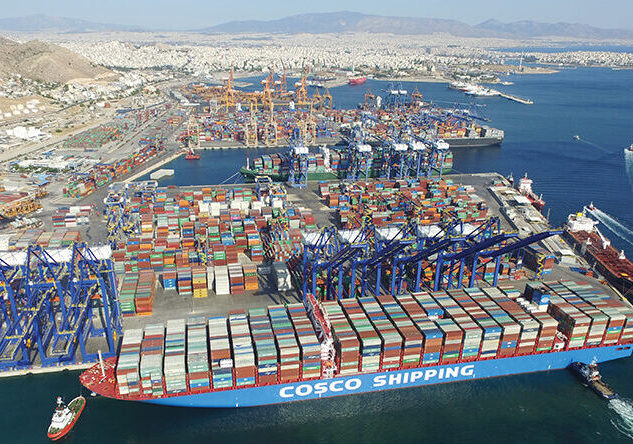PortEconomics co-directors Thanos Pallis and Peter de Langen had the opportunity to present their current portstudy in progress on geopolitical leverage in maritime transport and global supply chains at the workshop on Globalization, Shipping and Trade, organized in Paris on October 12, 2023.
Globalized production entails large flows of goods that are for 80% of them shipped over the seas. It is, therefore, essential to understanding the motivation of all stakeholders participating in the maritime transport of goods and their interaction with other actors of trade flows: cities, ports, and the broader hinterland.
The Paris School of Economics welcomed economists working on international trade, shipping, geography and networks during a one-day workshop – generating interactions on these topics. The workshop was organized by the Globalization Chair, which aims to create a privileged forum for reflection, exchange and transfer between researchers and all society entities interested in the reconfiguration of globalization and its implications.
The portstudy
In their presentation, Thanos and Peter explore whether countries might create geopolitical leverage through international activities of State Owned Enterprises (SOEs) in maritime transport and global supply chains.
The underlying assumption of the theoretical framework that they put forward is that foreign investments in seaports can only be partially understood by examining (as is frequently the case):(a) the trends in a given port’s competitiveness (i.e. port economics) and/or long-term prospects and/or (b) the economic context that shapes the decisions of countries to proceed with particular port reforms. A third dimension is present and dominant in the case of such investments: the Home country’s capacity to generate ‘leverage’ at the Host country of the investments via SOEs activities.
The work currently in progress, with Thanos and Peter presenting in Paris, extracts from one of the case studies included in the analysis. This is one of the most publicized cases of FDIs in ports by a State Owned Enterprise (SOE), the privatisation of the Port of Piraeus.
Revisiting the privatisation of the port of Piraeus and the involvement of a SOE – initially as a terminal operator (since 2009) and later as owner of the managing entity of the port (since 2016), Thanos and Peter identified geopolitical leverage to be present in various dimensions. At least in the particular case study, there are potential dimensions of such geopolitical leverage that we found moderate evidence or no evidence at all. The latter finding implies that research on additional cases is worthy of reaching valid conclusions – i.e. are the conditions for leverage ad hoc, or are there broadly applied conditions that lead to the creation of leverage? In this particular case, there are indications that such leverage generation has already benefited the SOE. The international and national economic contexts (i.e., crises in the host country have provided favourable conditions for increased leverage creation. The study concludes by calling for expanding the dimensions applied to analyse port reforms when SOEs are involved.
You might read the presentation here: Palis A.A. & De Langen P.W. (2023). Piraeus privatisation revisited: Port Policy, Economic Policy or Geopolitics? Workshop on Globalisation, Shipping and Trade, Paris School of Economics, October 2023.












